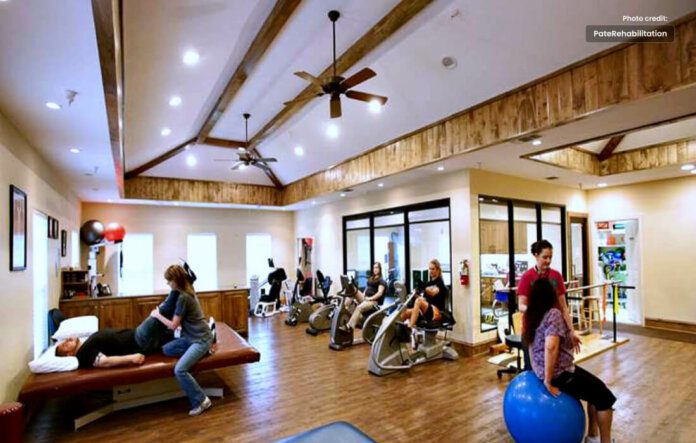Rehab: Term for closely-monitored programs aiding addiction recovery.
Introduction
Rehabilitation, or rehab, is an essential process that aims to restore physical, mental, and emotional well-being to individuals facing various challenges. Whether recovering from an injury, addiction, or a mental health issue, rehabilitation provides a path to healing and renewal. Further, we will explore the significance of rehab, the different types of rehab programs, and the transformative impact they have on people’s lives.
Understanding Rehabilitation
Rehabilitation is a comprehensive approach that addresses the diverse needs of individuals seeking recovery. It can be a critical step after experiencing a debilitating injury or surgery, battling addiction, or dealing with mental health disorders. The overarching goal of this is to enable individuals to regain independence, improve their quality of life, and reintegrate into society with renewed vigor.
Types of Rehab Programs
-
Physical Rehabilitation:
Physical rehab caters to individuals who have suffered injuries or undergone surgical procedures that impact their mobility and physical functionality. It involves personalized exercise regimens, physiotherapy, occupational therapy, and sometimes the use of assistive devices. Whether it’s recovering from a sports injury or regaining motor skills after an accident, physical rehabilitation plays a pivotal role in restoring strength and functionality.
-
Substance Abuse Rehabilitation:
Addiction to drugs or alcohol can have devastating effects on a person’s life. Substance abuse programs offer a supportive and structured environment to help individuals overcome their dependencies. These programs often combine counseling, group therapy, and medical interventions to address the root causes of addiction and develop healthy coping mechanisms.
-
Mental Health Rehabilitation:
Mental health rehab is designed for individuals dealing with various mental health disorders such as depression, anxiety, bipolar disorder, and schizophrenia. The focus here is on teaching coping strategies, improving interpersonal skills, and fostering emotional resilience. Therapies like cognitive-behavioral therapy (CBT), dialectical behavior therapy (DBT), and art therapy are commonly used to promote healing and emotional stability.
The Rehab Journey
-
Assessment and Goal Setting:
The journey begins with a thorough assessment conducted by a team of healthcare professionals. They evaluate the individual’s condition, strengths, and limitations to create a personalized treatment plan. Goal setting is an essential part of this phase, as it provides a roadmap for the individual’s progress throughout the rehab process.
-
Treatment and Therapy:
Once the treatment plan is established, the individual begins the intensive rehab process. Depending on the type of rehab, this could involve physical exercises, counseling sessions, skill-building workshops, and educational programs. The rehab team works closely with the individual, providing guidance, support, and encouragement.
-
Emotional Support:
Rehab can be emotionally challenging, as it often involves confronting painful memories, fears, and traumas. Emotional support from peers, counselors, and family members is crucial during this time. Group therapy sessions allow individuals to connect with others going through similar experiences, fostering a sense of community and understanding.
-
Progress Tracking and Adjustments:
As the individual progresses through rehab, the team continuously monitors their development. Regular assessments are conducted to measure improvement and make necessary adjustments to the treatment plan. Flexibility is essential as each person’s journey to recovery is unique and may require modifications along the way.
-
Transition and Aftercare:
As the rehab program nears completion, individuals are prepared for their transition back to regular life. This phase often includes creating a relapse prevention plan for those in substance abuse rehab or offering guidance for maintaining physical improvements. Aftercare and ongoing support are vital to prevent relapses and ensure sustained progress.
Find out more about https://rockedgeurdu.com/
The Transformative Impact of Rehab
Rehabilitation is more than just a process; it is a transformative experience. It empowers individuals to reclaim their lives, develop resilience, and rediscover their potential. Here are some of the transformative impacts of rehab:
- Restoring Independence: This enables individuals to regain their independence, allowing them to perform daily tasks and activities they once struggled with.
- Boosting Confidence: As individuals make progress in rehab, their confidence soars. They gain a sense of accomplishment and newfound belief in their ability to overcome challenges.
- Strengthening Relationships: It often involves family counseling and support, leading to stronger and healthier relationships between the individual and their loved ones.
- Enhancing Mental Well-being: Mental health rehab equips individuals with coping mechanisms and tools to manage their emotions and mental health effectively.
- Preventing Relapses: Substance abuse rehab equips individuals with the skills to resist triggers and avoid relapses, supporting long-term recovery.
Conclusion
Rehabilitation is a transformative journey that embodies the resilience of the human spirit. It provides a lifeline for those facing physical, emotional, or mental challenges, offering hope, healing, and renewal. Through personalized treatment plans, emotional support, and goal-oriented therapy, rehab paves the way for individuals to reclaim their lives and build a brighter future. Let us embrace the power of rehab, recognizing its significance in fostering a healthier and more compassionate society.




